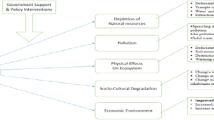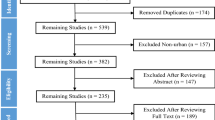Abstract
A model was outlined (i) to explain readiness to proenvironmental commitments and decisions in everyday life by six categories of predictor variables, including justice appraisals of pollution control, basic rights, appraisals of pollution, of pollution causation, of the efficacy of pollution control measures, and of ecological responsibility, and (ii) to generate hypotheses on the relationships between the predictor variables. Model variables were assessed by a questionnaire study (N=518) referring to the problem of air pollution. Proenvironmental commitments and decisions could be well predicted by morally relevant appraisals, especially by justice appraisals (e.g., approving proenvirommental laws, taxes, and subsidies, rejecting the justice of the current environmental policy and of mere appeals), whereas predictors representing self-protective motivations remained insignificant. Justice appraisals are in line with the “causation principle of justice”: Those who caused the pollution are made responsible for its reduction and should pay the costs for the pollution control. Results demonstrate that justice appraisals are essential determinants of people's ecologically relevant emotions, cognitions, and engagements. Moreover, they reveal that the responsibility for pollution control is not left with state and economy but is also regarded as a matter that concerns the citizens.
Similar content being viewed by others
References
Ajzen, I. (1991). The Theory of Planned Behavior. Some unresolved issues.Organ. Behav. Hum. Decision Process. 50: 179–211.
Amelang, M., Tepe, K., Vagt, G., and Wendt, W. (1977). Mitteilung über einige Schritte der Entwicklung einer Skala zum Umweltbewusein.Diagnostica 23: 86–88.
Bamberg, S., and Schmidt, P. (1993). Verkehrsmittelwahl — eine Anwendung der Theorie geplantes Verhalten.Z. Sozialpsychol. 24: 25–37.
Billig, A. (1994). Ermittlung des ökologischen Problembewußtseins der Bevölkerung. (Forschungsbericht des Umweltbundesamts: 101 07 104 UBA-FB 93-137), Umweltbundesamt, Berlin, Germany.
Conference of European Statisticians (ed.). (1987).Environment Statistics in Europe and North America: An Experimental Compendium, United Nations Publications, New York.
Crowne, D. P., and Marlowe, D. (1960). A new scale of social desirability independent of psychopathology.J. Consult. Clin. Psychol. 24: 349–354.
Darnay, A. J. (ed.). (1992).Statistical Record of the Environment, Gale Research Company, Detroit.
Epstein, S. (1985). Controversial issues in emotion theory. In Shaver, P. (ed.).Review of Personality and Social Psychology, Sage, Beverly Hills, pp. 64–88.
Ernst, A. M., and Spada, H. (1993). Bis zum bitteren Ende? In Schahn, J., and Giesinger, T. (eds.),Psychologie für den Umweltschutz, Psychologie Verlags Union, Weinheim, Germany, pp. 17–27.
Fishbein, M., and Ajzen, I. (1975).Belief Attitude, Intention, and Behavior. An Introduction to Theory and Research, Addison-Wesley, Reading, MA.
Hardin, G. (1968). The tragedy of the commons.Science 162: 1243–1248.
Hopper, J. R., and Nielsen, J. M. (1991). Recycling as altruistic behavior. Normative and behavioral strategies to expand participation in a community recycling program.Environ. and Behav. 23: 195–220.
Horwitz, W. A. (1994). Characteristics of environmental ethics: Environmental activists' accounts.Ethics and Behavior 4: 345–367.
Hummel, C. F., Levitt, L., and Loomis, R. J. (1978). Perceptions of energy crisis. Who is blamed and how do citizens react to environment-lifestyle trade-offs?Environ. Behav. 10: 37–88.
Institut für Demoskopie Allensbach. (1988). In welchen Zustand ist unsere Umwelt? Negativmeldungen vor allem aus großen Städten.Plan. Anal. 13: 41–43.
Kals, E. (1993). Ökologisch relevante Verbotsforderungen, Engagement- und Verzichtbereitschaften am Beispiel der Luftqualität. Dissertation, Universität Trier, Fb I-Psychologie, Trier, Germany.
Kals, E. (1994). Straßenverkehr und Umweltschutz: Die Ökologische Verantwortung des Bürgers. In Flade, A. (ed.),Mobilitätsverhalten, Psychologie Verlags Union, Weinheim, Germany, pp. 255–266.
Kals, E., and Montada, L. (1994). Umweltschutz und die Verantwortung der Bürger.Z. Sozialpsychol. 25: 326–337.
Katzev, R. D., and Pardini, A. U. (1987–1988). The comparative effectiveness of reward and commitment approaches in motivating community recycling.J. Environ. Syst. 17: 93–113.
Kessel, H., and Tischler, W. (1984).Umweltbewußtsein, Ökologische Wertvorstellungen westlicher Industrienationen, Edition Sigma Bohn Verlag, Berlin, Germany.
Kley, J., and Fietkau, H.-J. (1979). Verhaltenswirksame Variablen des Umweltbewußtseins.Psychol. Praxis 1: 13–22.
Kushler, M. G. (1989). Use of evaluation to improve energy conservation programs: A review and case study.J. Soc. Issues 45: 153–168.
Lazarus, R. S., Kanner, A. D., and Folkman, S. (1980). Emotions: A cognitive phenomenological analysis. In Plutchik, R., and Kellerman, H. (eds.),Emotion, Theory, Research, and Experience. Theories of Emotion, Vol. 1, Academic Press, New York, pp. 189–217.
Lück, H. E., and Timaeus, E. (1969). Skalen zur Messung Manifester Angst (MAS) und Sozialer Wünschbarkeit (SDS-E und SDS-CM).Diagnostica 15: 134–141.
Lydon, J. E., and Zanna, M. P. (1990). Commitment in the face of adversity: A value-affirmation approach.J. Pers. Soc. Psychol. 58: 1040–1047.
Lynne, H. E., and Rola, L. R. (1988). Improving attitude-behavior prediction models with economic variables: Farmer actions toward soil conservation.J. Soc. Psychol. 128: 19–28.
Maloney, M. P., and Ward, M. P. (1973). Ecology: Let's hear from the people. An objective scale for the measurement of ecological attitudes and knowledge.Am. Psychol. 28: 583–586.
Montada, L., Schmitt, M., and Dalbert, C. (1986). Thinking about justice and dealing with one's own privileges: A study of existential guilt. In Bierhoff, H. W., Cohen, R., and Greenberg, J. (eds.),Justice in Social Relations, Plenum Press, New York, pp. 125–143.
Montada, L., and Schneider, A. (1989). Justice and emotional reaction to the disadvantaged.Soc. Justice Res. 3: 313–344.
Nozick, R. (1974).Anarchy, State and Utopie, Basic Books, New York.
Platt, J. (1973). Social traps.Am. Psychol. 28: 641–651.
Rat von Sachverständingen für Umweltfragen. (ed.). (1978).Umweltgutachten, Kohlhammer, Stuttgart, Germany.
Rat von Sachverständigen für Umweltfragen. (ed.). (1987).Umweltgutachten, Kohlhammer, Stuttgart, Germany.
Schahn, J., and Holzer, E. (1990). Konstruktion, Validierung und Anwendung von Skalen zur Erfassung des individuellen Umweltbewußtseins.Z. Diff. Diagnos. Psychol. 11: 185–204.
Schwartz, S. H. (1970). Moral decision making and behavior. In Macaulay, J., and Berkowitz, L. (eds.).Altruism and Helping Behavior, Academic Press, New York, pp. 127–141.
Sitter, B. (1987). Wie läßt sich Ökologische Gerechtigkeit denken?Z. Ökolog. Ethik 31: 271–295.
Spaccarelli, S., Zolik, E., and Jason, L. A. (1989–1990). Effects of verbal prompting and block characteristics on participation in curbside newspaper recycling.J. Environ. Syst. 19: 45–57.
Spada, H., and Opwis, K. (1985). Ökologisches Handeln im Konflikt: Die Allmende-Klemme. In Day, P., Fuhrer, U., and Laucken, U. (eds.),Umwelt und Handeln, Attempto, Tübingen, Germany, pp. 63–85.
Stern, P. C., Dietz, T., and Kalof, L. (1993). Value orientations, gender, and environmental concern.Environ. Behav. 25: 322–348.
Stern, P. C., and Gardener, G. T. (1981). The place of behavior change in the management of environmental problems.Z. Umweltpolitik 2: 213–239.
Umweltbundesamt. (ed.). (1994).Daten zur Umwelt 1992–1993, Erich Schmidt Verlag, Berlin, Germany.
Author information
Authors and Affiliations
Rights and permissions
About this article
Cite this article
Montada, L., Kals, E. Perceived justice of ecological policy and proenvironmental commitments. Soc Just Res 8, 305–327 (1995). https://doi.org/10.1007/BF02334710
Issue Date:
DOI: https://doi.org/10.1007/BF02334710




